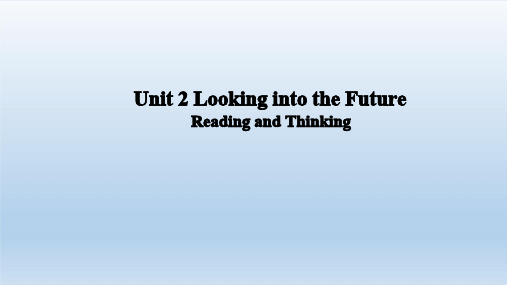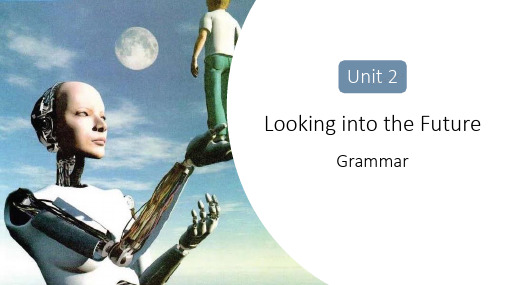人教版新教材选修第一册unit2重点句型和语法讲解
高中英语 人教版选修第一册unit2重点句型和语法讲解

Unit 2LOOKING INTO THE FUTURE重点句型1.For example,the phrase in my opinion tells us that the passage is likely meant to persuade.比如,in my opinion这个短语告诉我们,这篇文章可能意在说服。
2.Or,have you ever forgotten to switch off the TV or computer?或者,你是否忘记过关电视或电脑?3.However,in the not-too-distant future,we will be living in smart homes that will lock the door for us when we are away and remember to switch off the TV when we forget.然而,在不太遥远的未来,我们将生活在智能家居里,它能在我们离开时锁门,在我们忘了关掉电视的时候记得关掉它。
4.These smart homes will keep us secure,save us energy,and provide a more comfortable environment to live in.这些智能家居将保护我们的安全,节省能源,并提供一个更舒适的生活环境。
5.The future home will use integrated sensors to tell when you leave home each morning,and then go into an energy-efficient mode all by itself.未来的家将使用集成传感器来判断你每天早上离开家的时间,然后自己进入一个节能模式。
6.Your home will also learn your daily routine and preferences,so everything will be ready for you when you get home each evening.你的家也会了解你的日常习惯和喜好,所以每天晚上你回家时,一切都会为你准备就绪。
人教版高中英语选择性必修一 Unit 2 单元重点回顾

prediction n.预言;预测;预报;预告 make a prediction for 对……做出预言/预测 9.forecast vt.& n.预测;预报
4.preference n.爱好;偏爱 have a preference for
偏爱
prefer vt.更喜欢
prefer sth to sth与某物相比更喜欢某物
prefer to do/doing sth更喜欢做某事
prefer doing sth to doing sth宁愿做某事而不愿做某事
switches on and off...
3.However,I could not help but
feel anxious.
4. Better not hang out with Sam then.
5.Nevertheless,I will always look on the positive side of change and
absent adj.缺席的;不在的;心不在焉的be absent from 缺席
-7-
单元重点回顾
主题语境 重点词汇 重点句型 重点语法
13.advocate vt.提倡;支持;拥护 n.提倡者;支持者;拥护者
advocate sth/doing sth主张(做)某事
advocate that...(should)do sth主张/提倡……做某事
in a
2023-2024人教版高中英语选择性必修第一册第二单元u语法

E1 Unit2 Looking into the futureGrammarMotto: Knowledge is power. 知识就是力量。
Ⅰ. Learning aims:1.To identify and analyse the usages of the future tense.2.To master the usages of the future progressive tenseIII. Consolidation:Level A fill in the blanks1. Mary can't be walking outside tomorrow morning because she (work)in the research institute then.2. If you plant watermelon seeds in the spring, you (eat)fresh watermelons in the summer.3. Jane can't attend the meeting at 3 o' clock this afternoon because she (teach)a class at that time.4. Could I use your car tomorrow morning?- - Sure. I (repair)the electrical equipment at home.5. I'm sick of rain and the bad weather! Hopefully, when we wake up tomorrow morning, the sun (shine).6. Tomorrow we 're going to analyze the data in the afternoon. So at 15: 00, we (analyse )the data.7. The academy 's music group (give)a big show tomorrow night and two more on the weekend.8. It' s impossible to encounter him in the supermarket at 3 o' clock this afternoon, becausehe (attend)an important opening ceremony at that time.9. The gentle girl's family (enjoy)their holiday in Huangshan this time next week.10. - -Shall we meet tomorrow afternoon?- -Not before 3 o'clock. I (work)in the office then.。
人教版选修一Unit2 Looking into the future知识框架

Unit2 Looking into the Future一、话题角度:1、科技发展及其对人的影响2、科技发展的过程(顺利过程or艰难过程)3、科技对人衣食住行的影响(eg;科技与环保、科技与健康、智能家居、空中飞车、无人驾驶)二、Reading:1、智能家居让生活更便捷(从智能控制、健康监测、灾害预防角度展开文章介绍)2、我们对于新科技的态度(支持or反对,文章用on the one hand,on the other hand展开阐述观点,并举出具体例子支撑观点,如美国Amish民族一直居住在乡下隔绝网络与科技,支持的观点具体描述科技可以预测自然灾害、社交更便捷)三、Listening:1、不同职业群体预测未来(听力中要注意以下词汇:occupation、job、work、predict、prediction、imagine、forecast)以及未来可能会遇到的挑战(difficulties、challenge、opportunities、change)2、人工智能相关话题(artificial intelligence 、AI、technology)四、Speaking:预测未来(行业、职业、衣食住行、问题、挑战、机会、自动化、智能机器人、全球变暖、克隆技术)预测未来,有如下表达:1、I think/believe/predict that in the future…2、By 2030,we will…3、I can imagine/forecast…4、One challenge will be…5、We will be doing…6、My prediction is that…7、In the (distant)future there will …8、I doubt / don't think that…9、We will have the opportunity to …10、We are going to…五、Writing:对于科技引起的变化写出你的观点(哪些方面有变化、变化是好的方面还是不好的方面进而提出自己对于科技变化的观点等)六、语法:将来进行时的表达1、形式:主语+will/shall (not)be doing ;Will/Shall +主语+(not)be doing…?2、基本用法:用于表示最近或较远的将来正在进行的动作;将来进行时的用法和现在进行时用法一样,表示已计划好的事。
高中英语Unit2 课件新人教版选择性必修第一册

Unit 2 Looking into the Future Reading and ThinkingThe best way to predict the future is to create it.•What does it mean when we say that something such as a phone is “smart”?•What do you think a “smart” house can do that other houses cannot?重点词汇1、persuade vt.劝说,说服搭配:persuade sb. to do sth说服某人做某事persuade sb. into doing sth说服某人做某事persuade sb of sth使某人相信某事persuade sb+that从句使某人信服……2、switch vt. 转换,交换,调换vi&vt (使)改变,转变搭配:switch with…与……调班;与……交换switch over (to)转换(频道);转变(方法、产品等)switch on/off开/关(电灯、机器)等3、distant adj.遥远的,远处的,疏远的,心不在焉的搭配:be distant from与……距离遥远;与……不同4、preference n.偏爱,爱好,优先权,优待搭配:have a preference for偏爱,更喜欢show/give (a) preference to给……以优惠/优待5、instant n. 瞬间,片刻adj. 立即的,速食的,速溶的搭配:the instant + (that)从句一……就……6、catch fire着火7、available adj.可获得的;可购得的;可找到的;(人)有空的8、command n. 指令,命令;控制,指挥,掌握搭配:at one’s command听候某人的吩咐be in command (of)掌握,掌控,指挥have/take command of控制,掌握,开始指挥under sb’s command= under the command of sb由某人指挥9、critical adj.严重的,关键的,批判性的;挑剔的搭配:be critical about对……挑剔be critical to对……很关键/至关重要10、potentially adv.潜在地,可能地重点句型一、These smart homes will keep us secure, save us energy, and provide a more comfortable environment to live in.动词不定式作定语不定式作后置定语时,须放在被修饰的名词或代词的后面。
高二英语人教版(2019)选择性必修第一册 课件 unit2 Grammar

1. Go over what we have learnt. 2. Finish the Ex.1-3 on workbook P69.
Thanks
4.星期五你可以在我的办公室开会。那会儿我不用它。 You can have a meeting in my office on Friday . I won't be using it. 5.明天上午你做什么? What will you be doing tomorrow morning? 6.不久我们就要造一部新计算器进行更高级的运算。 It won't be long before that we will be making a new computer for more advanced calculation. 7.今晚我不能参加聚会了。我要给一位朋友送行。 I can't go to the party tonight . I'll be seeing off a friend.
汉译英 1.我们在校门口见面。 We shall be meeting at the school gate. 2.接下来我们干什么? What shall we be doing next? 3.你如果不这样做就会面临很大的困难。 If you don't do so, you will be facing great difficulties.
一般将来时
将来进行时 5.Smart toilets will be keeping constant track of your health as well. 6.Your lights will come on the instant you enter the door along with your favorite music or TV programmes, and you will find your dinner already prepared for you. 一般将来时
Unit2ReadingandThinking知识点讲解课件高中英语人教版选择性必修第一册

例句感知
着火
catch fire的用法
1 意为“着火,开始燃烧”,表示动作,不用被动。
2 表示“着火;在燃烧”还可以用on fire,表示状态。
例:Suddenly a pan of oil catches fire. Soon the house was on fire and it was impossible for people to escape.
Unit 2 Looking into the future
Para.4
防止某事发生
short
n. (电线) 短路
词性1
n. 短路;缺乏
short
搭配 词性2
in short 总之; 简言之 for short 作为简称(缩写)
adj. 短的;矮的;短缺的
例句感知
1. The short in our classroom resulted in a panic among us. 2. In short, they’re active learners. 3. We often run short of staff in the summer.
tomorrow is already the home of today. Nevertheless, it will take some years
before most new homes begin to use this new technology.
in this sense
含义
从这种(某种)意义上来讲
语法填空。
考点追击
1. Settlers flooded (flood) from Europe to America in the 19th century.
新教材人教版高中英语必修第一册Unit2 Travelling Around单词短语语法写作归纳总结

Unit 2 Travelling Around词语助读①on the coast沿岸off the coast在海面上along the coast沿着海岸②narrow/'nærəʊ/adj.狭窄的vi.& vt.(使)变窄[反义]broad adj.宽阔的③flat/flæt/adj.平坦的;扁平的n.公寓;单元房(英式英语)apartment n./ə'pɑːtmənt/公寓套房(美式英语)④powerful/'paʊəfl/adj.强有力的;有权势的;有影响力的power /'paʊə(r)/n.权利;力量rich and powerful nations富强的国家⑤emperor/'empərə(r)/n.皇帝empire/'empaIə(r)/n.帝国⑥now-famous adj.现在著名的该词是由“副词+形容词”构成的复合形容词。
⑦site/saIt/n.地点;位置;现场⑧take control of控制;接管⑨official/ə'fIʃl/adj.官方的;正式的;公务的n.官员;要员an official language官方语言原文呈现PERU is a country on the Pacific coast①of South America with three main areas:narrow②,dry,flat③land running along the coast[1],the Andes Mountains,and the Amazon rainforest.[1]running along the coast为现在分词短语作定语,修饰land。
In the 1400s and 1500s,Peru was the centre of the powerful④ancient Inca Empire.The Inca emperor⑤lived in the now-famous⑥site⑦Machu Picchu.Spain took control of⑧Peru in the 16th century and ruled until 1821.It is for this reasonthat Spanish is the main official⑨language of Peru.[2][2]本句是强调句型,强调的是原因状语for this reason。
- 1、下载文档前请自行甄别文档内容的完整性,平台不提供额外的编辑、内容补充、找答案等附加服务。
- 2、"仅部分预览"的文档,不可在线预览部分如存在完整性等问题,可反馈申请退款(可完整预览的文档不适用该条件!)。
- 3、如文档侵犯您的权益,请联系客服反馈,我们会尽快为您处理(人工客服工作时间:9:00-18:30)。
Unit 2LOOKING INTO THE FUTURE
重点句型
1.For example,the phrase in my opinion tells us that the passage is likely meant to persuade.
比如,in my opinion这个短语告诉我们,这篇文章可能意在说服。
2.Or,have you ever forgotten to switch off the TV or computer?
或者,你是否忘记过关电视或电脑?
3.However,in the not-too-distant future,we will be living in smart homes that will lock the door for us when we are away and remember to switch off the TV when we forget.
然而,在不太遥远的未来,我们将生活在智能家居里,它能在我们离开时锁门,在我们忘了关掉电视的时候记得关掉它。
4.These smart homes will keep us secure,save us energy,and provide a more comfortable environment to live in.
这些智能家居将保护我们的安全,节省能源,并提供一个更舒适的生活环境。
5.The future home will use integrated sensors to tell when you leave home each morning,and then go into an energy-efficient mode all by itself.
未来的家将使用集成传感器来判断你每天早上离开家的时间,然后自己进入一个节能模式。
6.Your home will also learn your daily routine and preferences,so everything will be ready for you when you get home each evening.
你的家也会了解你的日常习惯和喜好,所以每天晚上你回家时,一切都会为你准备就绪。
7...your smart home will detect it and provide you with the relevant information.……
你的智能家居将检测到它,并向你提供相关信息。
8.Many of these new innovations are already available and being used in some homes.
许多这些新发明已经存在,并在一些家庭中使用。
8.In this sense,the home of tomorrow is already the home of today.
从这种意义上说,明天的家已经是今天的了。
10.Your lights will come on the instant you enter the door along with your favourite music or TV Programmes,and you will find your dinner already prepared for you.
你一进家门,灯就会亮起,还有你最喜欢的音乐或电视节目(会自动播放),而且你会发现晚餐已为你准备好了
11.For example,the smart home could control the air conditioning and lights so that you would no longer have to turn switches on and off..
.例如,智能家居可以控制空调和灯,这样你就不用再打开和关闭开关了……
12.Care will also be taken to combine the building and surrounding architecture together to form an effective system.
还应注意将建筑物和周围建筑结合起来,以形成有效的系统。
13.However,I could not help but feel anxious.
然而,我不禁感到担心。
14.Better not hang out with Sam then.
最好不要和山姆闲逛。
15.Words such as predict,prediction,and forecast,are also used quite often when making predictions.
做出预测时,经常使用诸如predict,prediction和forecast等词。
16.In the article,various people said that the public should oppose the idea of developing driverless cars.
在文章中,各界人士纷纷表示,公众应该反对发展无人驾驶汽车的想法。
17.On the one hand,there are many different groups of people around the
world who live happily in the absence of new technology.
一方面,世界各地有许多不同的群体在没有新技术的情况下快乐地生活。
18.They advocate a simple life with an emphasis on hard work,family,and community.
他们提倡简单的生活,强调努力工作、家庭和社区。
19.Moreover,the Internet has made it possible for friends and family to keep in touch easily even if they are on opposite sides of the world.
此外,互联网使朋友和家人能够很容易地保持联系,即使他们在世界的另一边。
20.Nevertheless,I will always look on the positive side of change and accept it rather than resist it.
尽管如此,我将永远看到变革积极的一面,接受而不是抵制它。
本单元语法
一、将来进行时的构成
二、将来进行时的构成
1.表示最近或较远的将来正在进行的动作。
Don’t phone him between 5pm and 6pm.He’ll be having a meeting then.下午五点至六点之间不要给他打电话,那时他在开会。
2.表示按计划或安排要发生的动作。
The train won’t be leaving until one o’clock.
火车一点钟才开。
3.常用来表示预计即将发生或势必要发生的动作。
When shall we be meeting next time?
我们下次什么时候见面?
4.表示委婉语气。
Will you be needing anything else?
你还需要什么吗?
三、将来进行时与一般将来时的区别
1.将来进行时表示将来某时正在进行的动作; 而一般将来时表示将来某时将要发生的动作。
如:
What will you be doing at seven the day after tomorrow?
后天晚上七点你会在做什么呢?
What will you do at seven the day after tomorrow?
后天晚上七点你干什么?
2.将来进行时表示已有的安排;而一般将来时表示临时决定。
I’ll go to see him after school.
放学后我去看他。
I’ll be going to see him after school.
放学后我准备去看他的。
